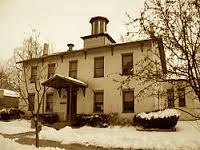Cold. Wet. The spray of an uncontrolled Hudson River can make you turn your face either from the chilled water, or the reek. Lansingburgh is a town north of Troy and Albany, NY, with about 3,000 souls dwelling there at the time of our story
Among those that called Lansingburgh home that dark November was a family originally from New England and New York, true patriots and founders of the republic, that had fallen on hard times and needed to move to simpler (or cheaper) housing. In May of 1838 the family departed from their home in Albany and moved to Lansingburgh, renting a two story home on what was then called River Road. Across the dirt road was a once thriving but now “getting by” ship building industry. Men of all ages worked to build the fastest, best ships they could to steer through the Hudson River eddies and rapids. And in the chill of the coming winter, those men would go to taverns and raise a glass and tell tales true and false to those who would listen.
Especially one young man. His name was Herman Melville, recently arrived with his family in that rented house, and Herman is eager to walk the gangplank and step on the decks of those fast ships moving toward the harbors of New York and beyond to the sea. He wishes to write stories of those exotic places he had seen, and the sea itself. The slight problem is he has never gone to sea, and seemed to have no chance of doing so.
Herman would gaze out his bedroom’s second story window and see the boats and ships held upon the shore of the boatworks. He had obligations to his family, now without any income as Herman’s brother Gansevoort, who was employed in Albany had fallen off a horse and was laid up in bed. Herman’s bed. So young Herman curls up in the attic with old quilts and his thoughts.
Opportunity exists, though. Herman is under the tutelage of Professor Ebeneezer Maltbie in the small school two streets over from his home.

Here Herman is studying engineering, a valuable skill for a young man residing so close to the recently completed Erie Canal, its watery end just across the wooden bridge he could walk to and find work. But Herman, although a good student, looks for other amusements. One is his group of friends, another is his love for enigmatic Miss Parmalee, the town and its taverns.
One night he raises a glass of cider with Professor Maltbie in a dimly lit tavern a block or so away from his home. From that one drink, Herman Melville, his family and friends, his town will feel the rumblings of Abolition, Civil War, a demand for freedom that was never supposed to end in robbery and murder. And these evil times would shadow Herman, his family, and friends for years to come.